College application stress is a natural but frustrating part of preparing for college. Thoughts like “I’m going to let down my family” or “What if I choose the wrong university?” are common among high school students and could lead to a lack of focus and motivation or even suicidal thoughts.
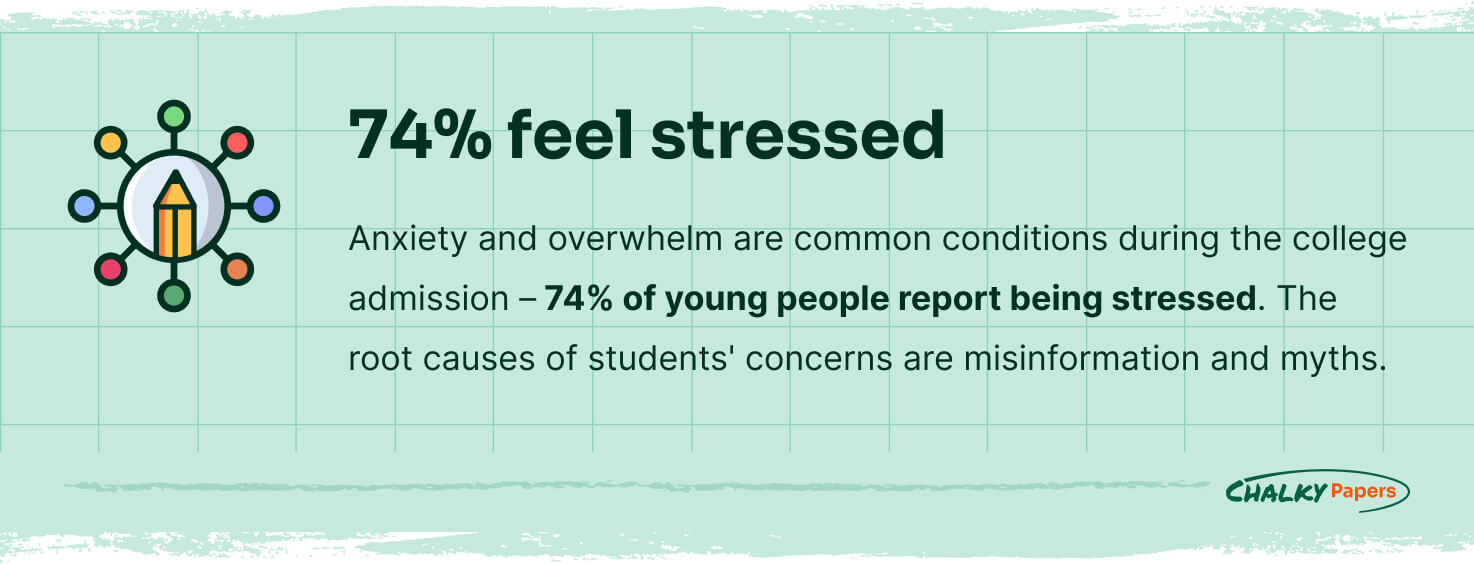
If you’re feeling overwhelmed by college applications, you aren’t alone! According to Princeton statistics, 74% of young people experience high stress levels because of their applications. Most of their fears are associated with uncertainty, misinformation, and myths around the application process.
This article will address the central stereotypes surrounding the admission process and provide tips on reducing stress and increasing your chance of getting into your dream college.
📩 What Is the College Admission Process?
Many times, stress comes from fear of the unknown. Hence, it’s essential to have a clear picture of the steps that the college admission process includes. Generally, we can distinguish the following stages:
- Researching and planning;
- Collecting the required information and documents;
- Completing and submitting application(s);
- Waiting for the results.
1. Research & Plan
Research and planning might be the most time-consuming part of a college application. It’s better to start looking for colleges that interest you during your junior year. For in-depth research, we recommend using college websites, guidebooks, and ranking lists, as well as contacting students directly. To gain more exposure, you can also visit college fairs and tours.
At this stage, you should also focus on what you must do to be a competitive applicant. However, building a new personality to fit your dream college is not the best idea. Instead, look for schools that align with your goals, academic strengths, and interests.
2. Collect the Documents
The list of required documents differs according to each college. However, most schools ask for two or three recommendation letters from teachers, coaches, or mentors. If you want to receive thoughtful, well-written letters, you’ll want to ask your teacher beforehand, for example, in the spring of your junior year.
Besides recommendation letters, you might need to gather your social security number, high school code, a copy of your high school transcript, and other documents. Visit college websites and make a checklist so you won’t forget anything.
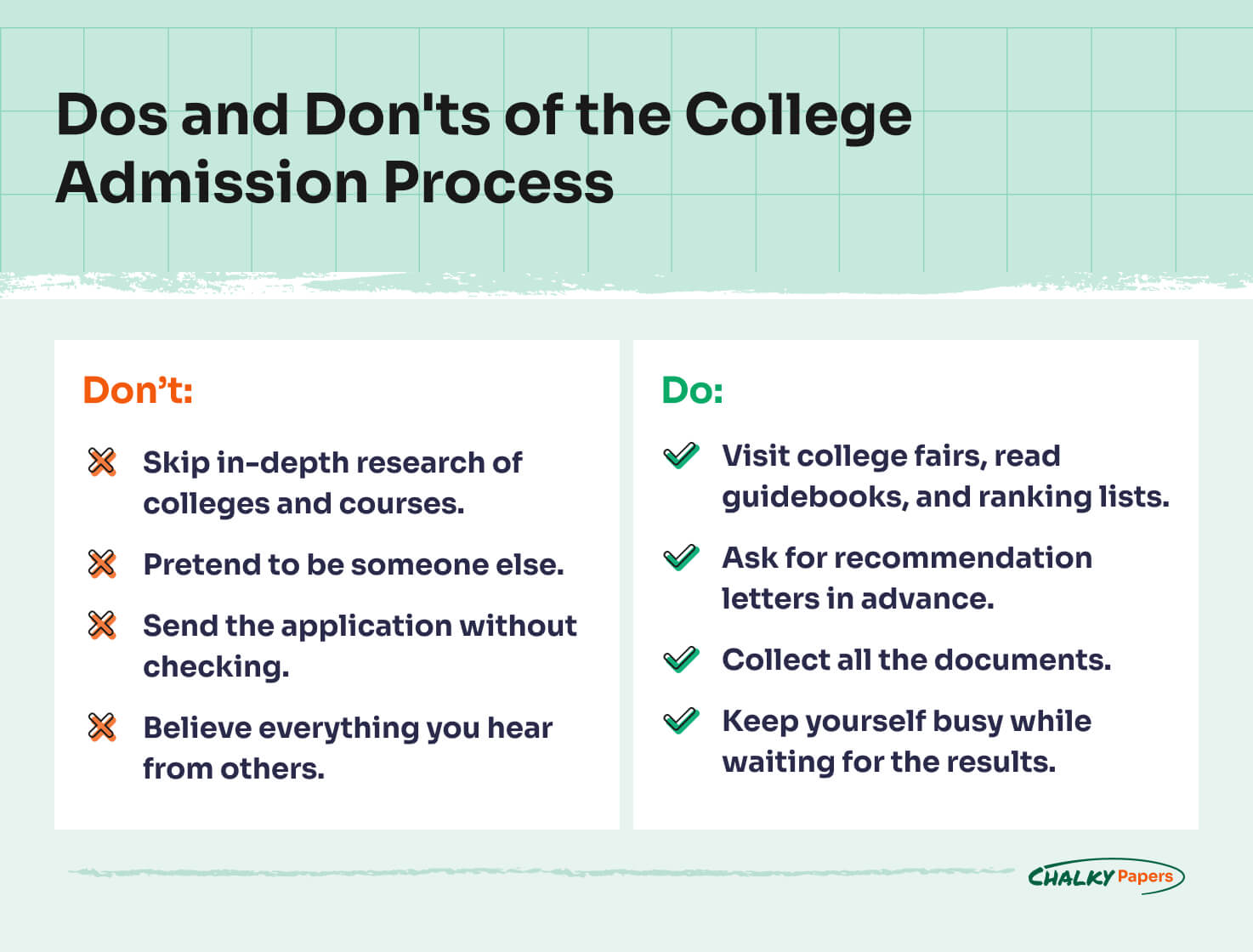
3. Fill in the Application
When it comes time to apply, you should decide if you want to submit your materials early. Many colleges allow applicants to apply for an early deadline (sometime in the fall). We recommend early submission only if you’ve found the school you’re certain will fit you the best.
The key elements of the college application are your score reports, transcript, letters of recommendation, and application essay. Some colleges will also ask you to list your extracurricular activities, so check each school’s admissions requirements. Also, don’t forget to review your application and confirm that all the files have been correctly uploaded before you hit the submit button. Then, take a deep breath and get ready for the waiting period…
4. Wait
For many students, waiting is the hardest part of the application process. On average, it takes colleges four to six weeks to decide, but sometimes, students must wait longer.
While some students disconnect when they hit the “submit” button, others constantly check the schools’ websites for updates. We advise balancing the two approaches and not letting the uncertainty destabilize you. Keeping yourself busy with things that bring you joy is one of the best ways to survive the waiting period. Moreover, protect yourself from scary college myths and other people’s negative experiences.
❗ The Most Important Factors in College Admission
Some admission committees reveal crucial admission factors. However, many aspects remain a mystery out of the candidates’ control. Look at this list of what colleges seek in students to identify your strengths and weaknesses.
🙅♀️ 30 Biggest College Admission Myths Busted
MYTH#1 The most important criterion is your grades.
Indeed, your grades matter. However, college admission officers always keep in mind that the same course at different schools could vary in difficulty. Colleges also look for other evidence that candidates can succeed in college.
Our advice: Don’t be discouraged if your grades aren’t that good. If your grades suddenly dropped during a semester because of personal hardships, explain the reason for the change in your application. If you’ve never been an A+ student, try to compensate with extracurricular activities or by demonstrating an interest in the college.
MYTH#2 Test scores can make or break your way into college.
In reality, test scores are just one of many elements of an application package. Moreover, in 2025, two-thirds of colleges and universities in the USA, including the Ivy League, became test-optional. This allows you to choose whether to submit your SAT or ACT scores to a college.
Our advice: Before you skip the tests, consider whether you want to apply for scholarships. Some financial aid may depend on the scores to qualify applicants.
MYTH#3 The more extracurricular activities, the better.
When it comes to extracurricular activities, colleges value quality over quantity. In other words, being passionate about one occupation is more important than joining numerous clubs.
Our advice: Colleges look for a leadership progression, not just participation. It’s better to stick to one or two hobbies you’re passionate about and try to demonstrate good results there.
MYTH#4 You should ask for recommendations only from teachers who have given you As.
The best person to ask for a recommendation letter isn’t necessarily a teacher who gives you high marks. It’s better to choose a person who understands your strengths and weaknesses. This kind of mentor can best describe your character, persistence, and growth.
Our advice: For a recommendation letter, choose a teacher with whom you have had a good rapport. Even if you struggled with a subject, a teacher can describe how you demonstrated determination, which can become your most significant advantage.
MYTH#5 You shouldn’t be creative in your essay.
Another college application myth is that you should stick to a traditional essay or personal statement format. There are plenty of websites with free essay templates for candidates. Hence, you can imagine how many identical writings admission officers read daily.
Our advice: If you want your personal statement to stand out, reveal something about yourself. Make your essay authentic since this is an excellent opportunity to connect and make a first impression.
MYTH#6 Visit the campus as often as possible to make yourself memorable.
A campus visit can help you learn more about the college you want to apply to. However, this isn’t the only way to demonstrate your interest. You can make a call or email your questions, do an enthusiastic interview, or interact with representatives on social media.
Our advice: Spending a day on campus might be a good idea to see if your goals align with the school. However, don’t worry if you don’t have such an opportunity. Instead, find other ways to show that you’re passionate and curious.
MYTH#7 You should take easy classes to have a high GPA.
Many students fear ruining their academic records and so avoid taking AP classes. Sure, having a long A’s list is nice, but not all admission counselors will be impressed. Colleges love students who are open to academic challenges, even if they have some Bs in their AP classes.
Our advice: Remember that your GPA score is only one of many factors that may influence the admission officers’ decisions. Don’t be afraid of AP classes because they prepare you for intense work in college.
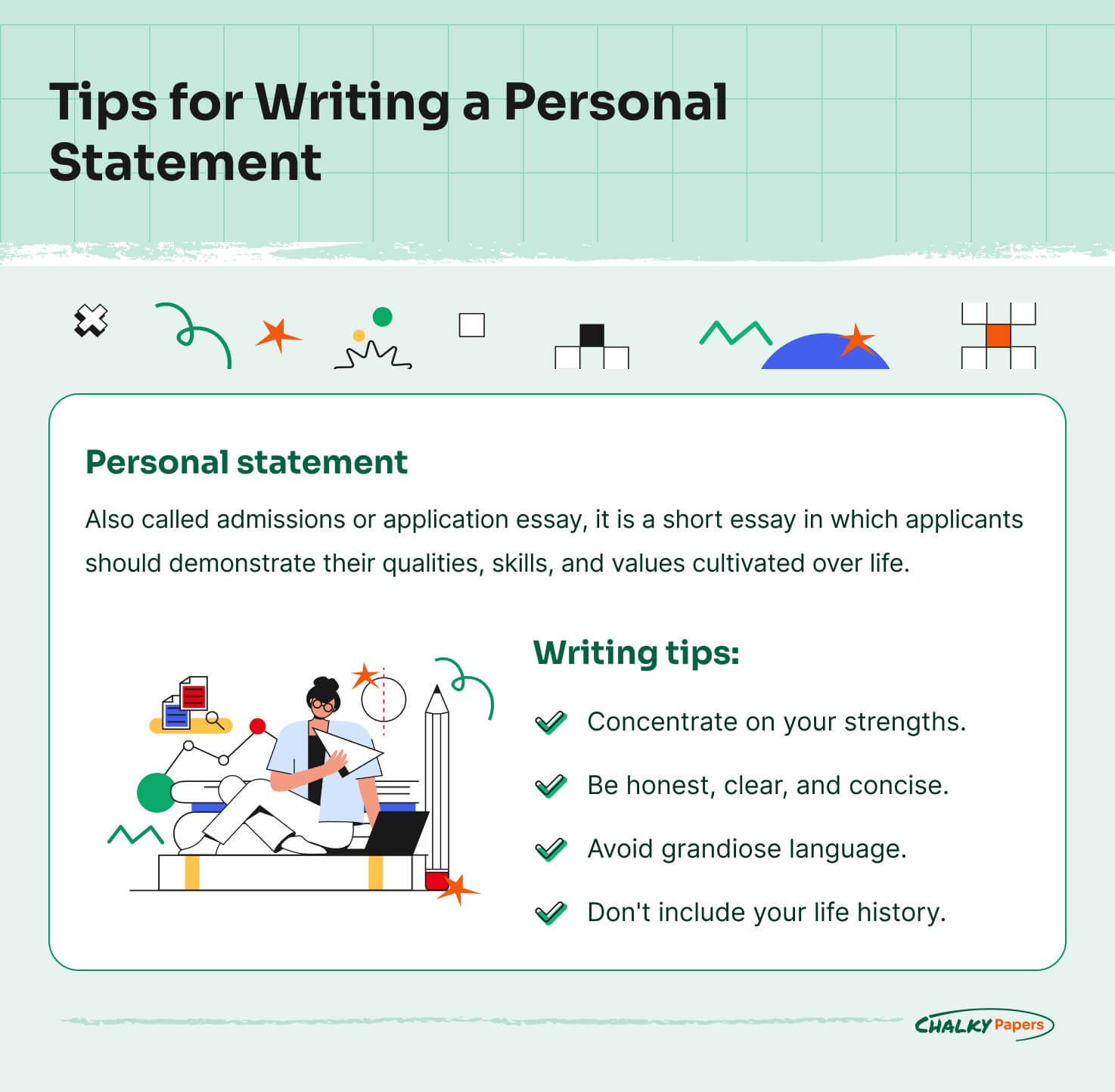
MYTH#8 You should ask reputable people for recommendation letters.
Mark Zuckerberg’s recommendation letter would be cool, but it won’t work if he doesn’t know you personally. Remember that recommendation letters are about you and not the people writing them.
Our advice: A recommendation letter from a famous person who knows little about you would be useless. Instead, ask your closest teacher who knows your potential, academic interests, and life goals.
MYTH#9 Optional interviews aren’t necessary.
Many colleges’ interviews are optional, but don’t skip them immediately. Interviews can be stressful, but they are a great opportunity to demonstrate your interest. Moreover, if your GPA score isn’t that high or you lack extracurricular activities, an interview is a good way to compensate for this.
Our advice: Consider the interview an opportunity to share what makes you a great candidate. Discuss your possible questions with an alumnus or a current student to ease your stress. You can also rehearse with a friend.
MYTH#10 Admission counselors never check social media.
You might think they don’t have time to investigate applicants’ social media accounts. Indeed, admission officers don’t stalk you on Twitter, Facebook, or Instagram, but they might want to check it at least once.
Our Advice: It’s a good idea to ensure you have nothing inappropriate posted, especially if you interact with college representatives online.
MYTH#11 You will never get into the college of your dreams.
When college admission stress overwhelms, many candidates give up on the school of their dreams. They believe that it will be too hard to be accepted when, in reality, they are already at the finish line.
Our advice: Throw this myth out the window and remember that there’s no obstacle you cannot overcome after working hard during high school. Don’t let your fears hold you back. You can make your dreams come true!
MYTH#12 You shouldn’t mention family responsibilities in your application.
Some students believe they should not discuss home responsibilities that take time and get in the way of their extracurricular activities. However, if you help run a family business or look after your younger siblings, these things are worth mentioning in your personal statement.
Our advice: Remember that many colleges seek students with real-life experiences. Let admission officers know you’ve earned good grades and taken care of your loved ones.
MYTH#13 Ivy League schools are too expensive.
Many promising and intelligent students do not apply to Ivy League schools out of fear that they will not be able to afford the tuition. While Ivy League schools remain one of the most expensive schools in the world, many financial aid opportunities offer zero debt.
Our advice: All eight Ivy League schools are committed to expanding their horizons to include diverse students. Nowadays, more money than ever is allocated to academic scholarships; give it a try!
MYTH#14 Admissions officers are looking for specific answers.
Every year, admission counselors meet hundreds of candidates who try to make a good impression. Many students fall victim to a myth of right and wrong answers during an interview. The truth is admission officers aren’t looking for specific answers. They’re looking for authenticity.
Our advice: Being your true self is the best way to engage with a college representative. Don’t try to match the image of an ideal candidate. Instead, be your best version and prove you’ll be a great community member.
MYTH#15 The more contact you have, the higher your chances are.
When it comes to demonstrating interest, many students believe that the more people they know in college, the better. They contact admission representatives every week, seeking some sort of interaction. Representatives might soon feel frustrated if a student constantly asks questions that can be easily answered with a quick search on the website.
Our advice: Creating a bond with the admission officer is essential, but communication should always be brief and relevant. Avoid getting on the nerves of the college staff if you want them to see you as a respectful community member.
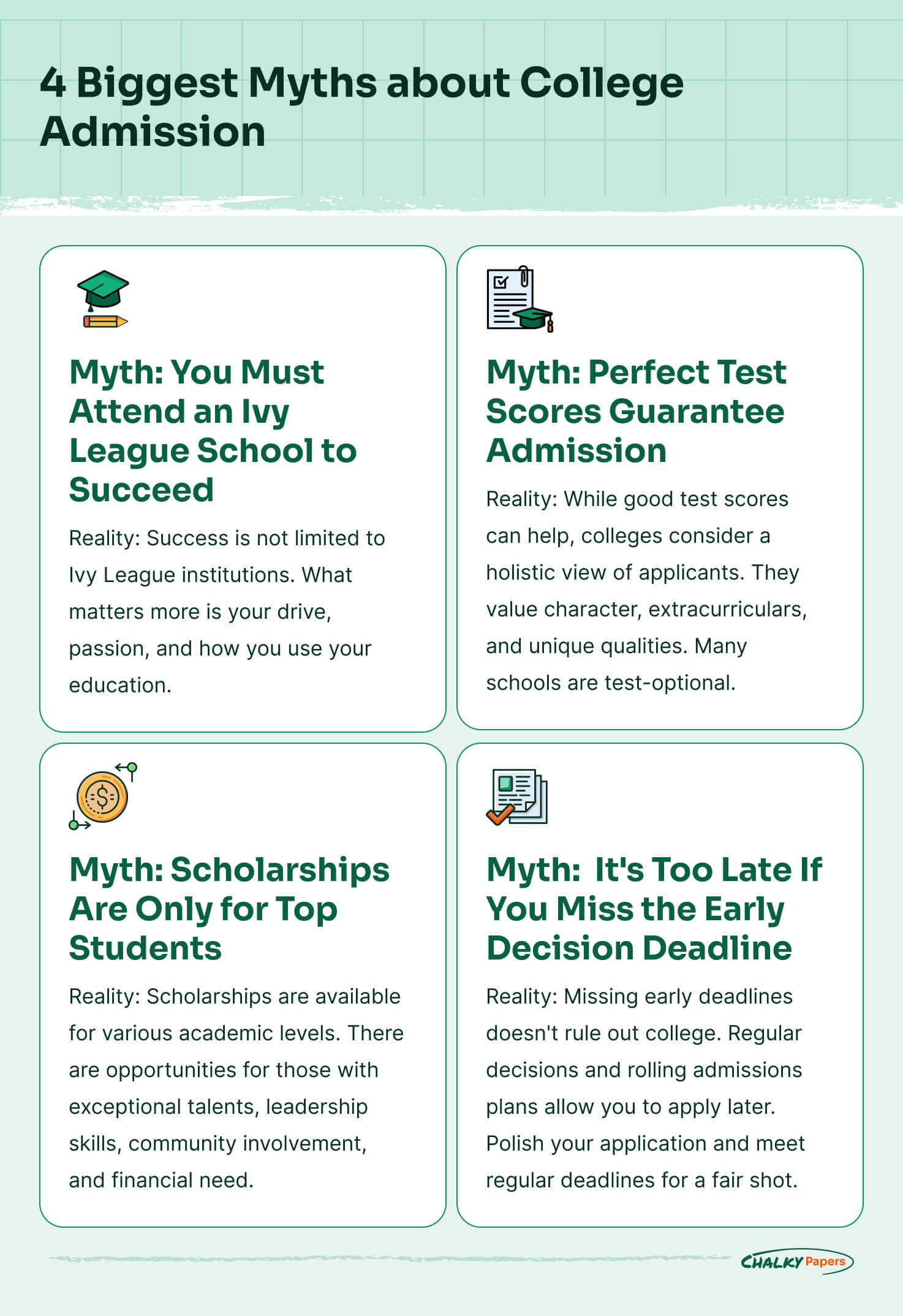
MYTH#16 You should start college preparation during your junior year.
Too many students wait until junior year to start planning for college, which builds up stress and pressure. To ensure you have enough time, begin to consider college admissions during your freshman year. Reflect on your academic interests, take campus tours, and engage in extracurricular activities.
Our advice: You don’t have to figure everything out during your freshman year. However, the more time you prepare for the college application, the better you set yourself up for success when applying.
MYTH#17 You need to take more AP classes.
Some students believe there’s a magic number of AP or IB classes you should take. What colleges value most is taking relevant courses from your school’s curriculum and maintaining a strong performance. If your school doesn’t offer AP classes, admission officers won’t hold that against you.
Our advice: If you have a chance, we recommend taking AP classes that correspond with the major you’re interested in. For example, your AP History class won’t make a big difference if you want to study statistics in college.
MYTH#18 Volunteering always looks impressive on college applications.
Of course, colleges want to see students giving back to their community. But, since many high schools require community service, it’s not that impressive for admission officers. What they are looking for is notable achievements or leadership roles.
Our advice: Volunteer hours can be valuable to your application if they are super meaningful to you. Our recommendation is to increase your responsibilities and take a leadership role.
MYTH#19 Sports and music are impressive extracurricular activities.
These two hobbies are fairly common activities among young people. If you want your application to stand out, remember that many candidates will have similar activities in their resumes.
Our advice: One possible solution is to demonstrate how you’ve achieved success in one of these areas. But if you haven’t been that successful, we advise you to focus on more unique extracurriculars that will look good on your application.
MYTH#20 It’s easy to win external scholarships.
Nowadays, many organizations offer college scholarships. Unfortunately, they’re difficult to win and demand that you meet more requirements than most colleges.
Our advice: Even though winning an external scholarship is a real challenge, it doesn’t mean you shouldn’t try. If you’re ready to face a competitive environment and dedicate your free time to the quest, go for it!
MYTH#21 Private schools are too expensive.
At first glance, the price tag for many private colleges is astronomically high. However, many of these colleges offer financial aid in the form of loans, grants, and work-study aid. A private college might be cheaper than a state school if you receive financial assistance.
Our advice: Don’t give up on private colleges because you think they’re too expensive. Always research financial aid, and don’t hesitate to contact the college administration for more details.
MYTH#22 You can send the same personal statement to different colleges.
Indeed, the temptation of copy-pasting your college essays is very high, especially with tight deadlines. However, a good application essay is always school-specific. You must answer “Why this college?” and provide as much evidence as possible.
Our advice: You must respond to each unique prompt when writing essays for different colleges. This is the only way to show that you’ve researched a school and that your academic goals align with their policy.
MYTH#23 You need to take AP exams independently if your school doesn’t offer such courses.
This is another common misconception among students and their parents. The truth is that colleges always evaluate candidates in the context of their high schools. You don’t have to take AP exams if no AP classes are available in your school curriculum.
Our advice: Instead, try finding other ways to highlight your intellectual curiosity in your application. For example, consider extracurricular activities that will make you stand out among other candidates who only take tests.
MYTH#24 You should submit your SAT scores even if the college is test-optional.
Nowadays, the majority of American colleges are test-optional. This means you don’t have to send your scores if you believe they don’t reflect your abilities. For 2025 admission, more than 80% of colleges will not require test scores and instead will focus on other achievements.
Our advice: Remember that test results aren’t the only way to measure your academic achievement. Whether you want to submit your scores is up to you, but know it isn’t necessary.
MYTH#25 You should attend a college summer program to increase your chances of acceptance.
College summer programs offer excellent opportunities to investigate the campus, meet professors, and decide if you and the school are a perfect match. However, these programs do not increase your chances of getting into college.
Our advice: If you can afford a summer program, consider this a chance to learn more about your dream college. Do not take it as a guarantee that you will be accepted there, even if you were able to make a good impression.
MYTH#26 Colleges have quotas on how many students they take from each high school.
This common misconception stresses students and creates unhealthy competition among classmates. In reality, admission officers can take multiple students from one high school or take no one from that school.
Our advice: Everything depends on the quality of your application. Focus on your performance and avoid comparing yourself with classmates.
MYTH#27 You’ll be admitted if your scores match the average accepted student’s results.
It might be helpful to check the acceptance rates to evaluate your chances. However, you should remember that there are not enough spots for all the qualified students, so standard GPA scores won’t be enough.
Our advice: Admission counselors evaluate many other factors beyond your academic record. We recommend working on your extracurricular activities, recommendation letters, and college essays to increase your chance of acceptance.
MYTH#28 You will be accepted because the college emails you weekly and sends beautiful brochures.
Never fall victim to a college marketing campaign. Without knowing anything about you, they might say, “We know you’re a perfect candidate for us!” This is because colleges want as many applicants as possible to appear more selective.
Our advice: Don’t take these beautiful brochures as a sign of acceptance. Instead, use them as a source of information about the college and its values.
MYTH#29 There’s only one perfect school for you.
Often, students get obsessed with their dream college, which builds up a lot of pressure. However, more than one college might perfectly match your goals and interests. More than 5,300 colleges are in the USA, so you might want to choose several options.
Our advice: We aren’t saying you won’t get into your dream college, but we do advise having a plan B and choosing several schools where you can grow and graduate with minimal debt.
MYTH#30 You should apply to a college only after having a campus tour.
While having a campus tour in person is certainly worth it, not all students have such an opportunity. But should you give up on a college only because you couldn’t travel there?
Our advice: Of course not! After the coronavirus pandemic, many colleges offered virtual tours around campus. If this isn’t an option, you can learn more about the school by contacting alumni, emailing the administration, or checking the college’s social media.
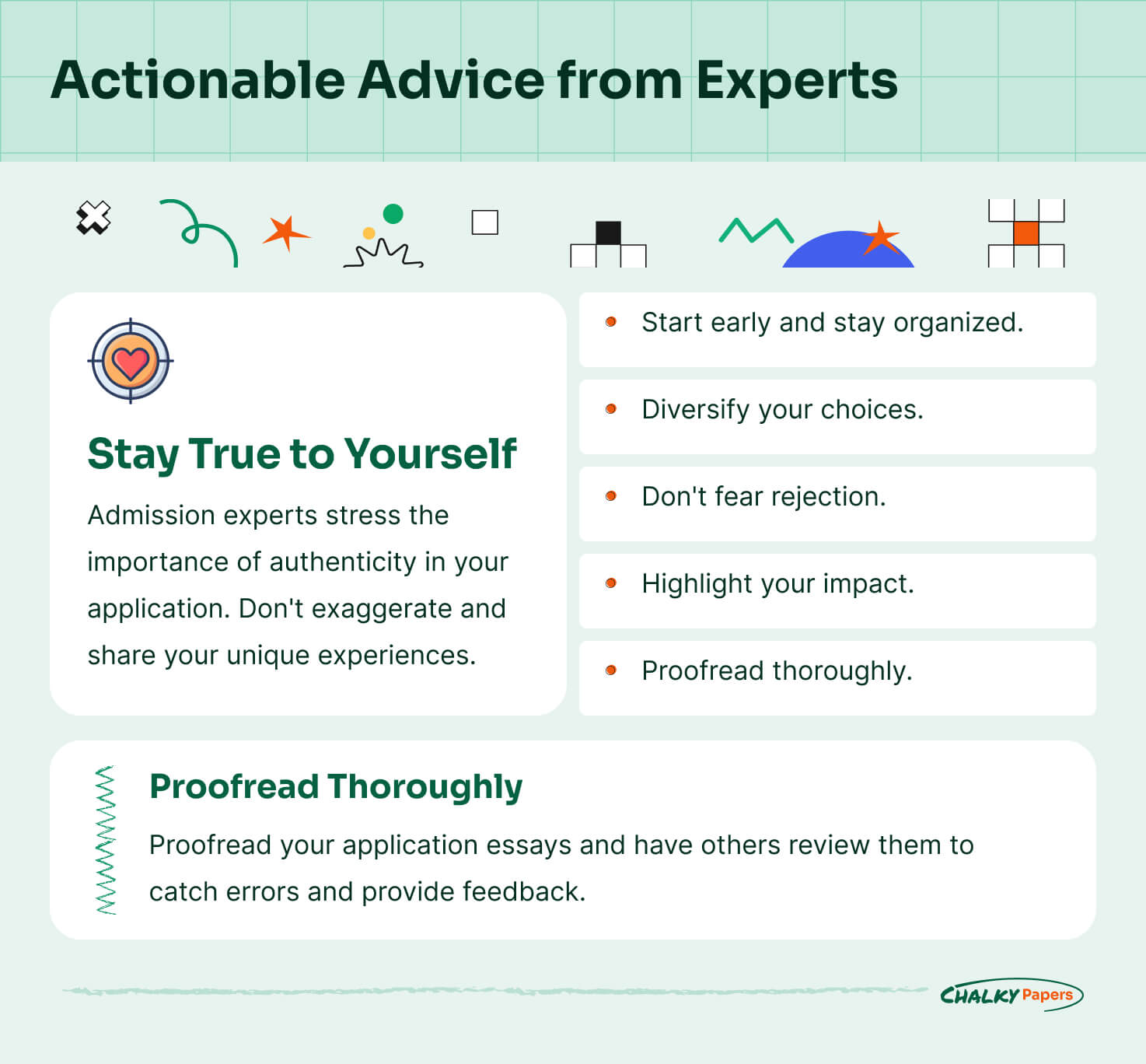
👨🎓 How to Raise Your Chances – Tips from College Admission Officers
Now that you know the main college myths, we can focus on true things. Have a look at these life-saving tips from college admission counselors.
- Keep your expectations realistic, and consider if the college matches your financial capabilities, academic interests, and learning style.
- Take your college research seriously, and try to find more information than is presented on the website.
- Play to your strengths, and don’t hesitate to show off your talents in your application.
- Find solutions to problems, and look for scholarships if you cannot afford the college of your dreams.
- Be honest in your college essay, and don’t pretend to be someone else because lying is evident to most admission counselors.
- Be open to any outcome to prevent stress and emotional burnout; always have a plan B.
- Don’t wait until the deadline to submit your application to avoid falling victim to technical glitches.
- During the interview, carefully listen to what you’re asked, and don’t try to respond with irrelevant, ready-made answers.
- If you mention a common extracurricular activity, always clarify in what way you’re unique about it.
- Carefully follow the admission form instructions, and don’t be lazy about double-checking to see if you did everything correctly.
⭐ Bonus: 10 Habits of Highly Successful College Applicants
Want to learn some first-hand experience from successful college applicants? We got you! Here’s the top student advice we’ve collected for you.
- Be proactive during your school years and take everything from the extracurricular experiences.
- Start mastering your organizational skills and good study habits as soon as possible.
- Commit to things you’re passionate about, not the activities that look cool on your resume.
- Don’t hesitate to demonstrate your interest and contact students or college administration first.
- Prioritize yourself and your mental health, and don’t apply to a college you don’t like because it’s prestigious or because your parents went there.
- Try to minimize procrastination, and don’t leave everything until your last semester at school.
- Don’t fear AP classes because you might be rewarded even if you don’t get the highest scores.
- Don’t rush to the early admission deadline if you need more time to work on your application package.
↪️ Conclusion
College admissions are stressful enough, and all the myths around this process make it even worse. “You should have a high GPA score.” “The more AP classes you have, the better.” “Private colleges are too expensive for you.” All these misconceptions can be very demotivating. However, if you start digging into these myths, you will see how little sense they make.
The best way to help yourself is to start preparing early and do your research. Take a campus tour, check college social media, and speak with other students and the school administration for a clear picture. Look for scholarships to help you afford your dream college, but be open to other school options. And finally, don’t try to be someone else or match the image of the perfect candidate. Embrace your uniqueness in your college essay and interview, and show that YOU will be a great addition to the college community.
